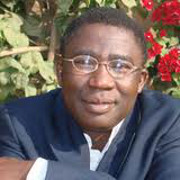 |
| Story photo: Rev. Dr. Musa Asake, General Secretary Christian Association of Nigeria. (Images courtesy Christian Association of Nigeria) |
While the Pentagon's top lawyer was looking at a post al-Qaeda era, experts say entering into that planning stage is premature.
At first blush, it seemed that the rise of the Arab Spring brought more freedom as regimes changed. However, human rights watchdogs say what it really did was help al-Qaeda affiliates flourish.
Reports from religious rights groups indicate that the changes distracted from the numbers of radicalized training camps that mushroomed in the last decade. Recruiting efforts increased, and there is evidence to support a link between al-Qaeda and the Boko Haram (whose name means "Western education is sin" in Hausa).
Rev. Dr. Musa Asake, General Secretary of the Christian Association of Nigeria, shares the bigger picture of concern.
"Once they get Nigeria, being the most-populous country in Africa: if Nigeria goes down, Africa goes down. That is their goal, and that is why they have connections in northern Mali. Some of them have friends there."
Mali's instability brings up another issue: the Boko Haram is beginning to represent a global threat with its militant connections not only to al Qaeda, but also to Somalia's al-Shabaab.
The group's leadership has set its sights on spreading its ideology across the region and into Europe. Since 1999, Muslim state leaders have imposed Sharia law in 12 northern states and parts of four others.
Their stated goal: to eradicate Christian presence from Nigeria. The sect says they'll stop their attacks only if the government implements Sharia law. As a result, the scale of persecution of Christians by Muslims has accelerated in Nigeria's northern states and as far south as the central plateau. The losses are staggering. As the death toll mounts into the thousands, Asake explains, "[sic] They continue to burn down our churches and kill innocent people. That is why we are crying out for the world to know, and seeking for whatever help can come, to help stop this thing."
Appeals to the Nigerian government for help yielded little in effective protection. Asake goes on to say, "We had hoped that this would go down, that they would be controlled; but they seem to be increasing by the day and spreading all over the northern states of the country. That's a concern to the Christians in the country."
As the attacks ramped up this year, the damage they inflicted was proof that the Boko Haram was better resourced and organized with outside help. Outraged, the Christian Association of Nigeria (CAN) called for help. They're still encouraging Christians not to retaliate through violence, notes Asake. "Pastors continue to preach ‘We should wait upon the Lord, as difficult as it is', and ‘Vengeance is the Lord's.' So, we continue to preach that and continue to look for ways that this thing will go, without all the retaliation."
CAN intends on taking its case to the International Criminal Court (ICC). Last month, The Hague's prosecutor found reasonable evidence that the Boko Haram Islamists had committed "crimes against humanity." It was the first step in the right direction. Asake says, "Our attorneys are looking into that, and it's going to be soon, but we have not made a timeline." The CAN is also asking the Nigerian Federal Government to name Boko Haram as a foreign terrorist group.
If terrorists are bombing churches because they're opposed to the sharing of the story of Christ, what kind of impact does that have on Gospel work? Actually, says Asake, there are more people committing their lives to Christ. Groups like Open Doors USA agree, noting the "paradox of persecution." Former CEO Carl Moeller has said, "As extremism rages in people's hearts, it produces a deeper vacuum, and that vacuum can only be filled by Jesus. Sometimes they don't even know that, but Jesus is still moving in people's hearts, even in the midst of this violence."
Asake asks for believers to "pray that God will continue to see us through these difficult times. Pray for those that have lost their loved ones in this situation. Pray for the leadership of the church, that we would continue to focus on God's work and preach the message of love, even in these difficult times."
No comments:
Post a Comment